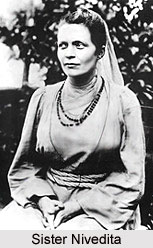 Sister Nivedita was an Anglo-Irish social worker, writer, teacher and disciple of Swami Vivekananda. It was he who gave her the name Nivedita that means `one who is dedicated to God`. She was not satisfied in the faith she was born and brought up but was influenced by the culture of India. So she found that her mission in life was to serve India through the emancipation of women through education. She worked to improve the lives of women of all castes. Her position as a westerner with Hindu credentials enabled her to say and do many things for Indians.
Sister Nivedita was an Anglo-Irish social worker, writer, teacher and disciple of Swami Vivekananda. It was he who gave her the name Nivedita that means `one who is dedicated to God`. She was not satisfied in the faith she was born and brought up but was influenced by the culture of India. So she found that her mission in life was to serve India through the emancipation of women through education. She worked to improve the lives of women of all castes. Her position as a westerner with Hindu credentials enabled her to say and do many things for Indians.
Margaret Noble was the childhood name of Sister Nivedita. She was known by that name before she was taken into the Ramakrishna order. She was born in Dungannon in Co-Tyrone on 28 October 1867. Her father, John Noble was a distinguished preacher and the minister of the Weslyan Church. She was her father`s favorite child and accompanied him when he visited the poor. Both her parents were associated with the Irish Home Rule Movement and were active participants. After her father`s death, she and her sister were sent to Halifax College for their education. She was deeply interested in music and natural sciences. She took up to teaching at the age of seventeen. She was deeply influenced by the new ideas of education of Pestalozzi and Froebel.
Sister Nivedita was a multi faceted woman. She was interested in arts, literature and in humanity. Her important literary works are The Master as I saw him, Travel Tales, Cradle Tales of Hindus-tan and many other writings. She was a prolific writer and kept a diary. She was a regular contributor to Modern Review and other journals. She promoted pan-Indian nationalist views both in her writings and in public meetings. She worked selflessly and with dedication and her name can never be forgotten by Indians.
As a youngster she was full of doubts and uncertainties about certain fundamental ideas in her religion. Though an Irish born, she loved India. It was then that she heard of Swami Vivekananda arrival in London. It was at Lady Margesson`s home that she met him for the first time. She was invited to attend a talk by the Swami and was spellbound by his personality. She admired his eloquent speech and deep knowledge in Vedas. His mission to redeem his people from poverty and misery attracted her. She desired to join in Swami`s mission.
At first Vivekanand was doubtful whether she could face the problems she has to encounter once she comes to India in the midst of the superstitious mass of half naked men and women who hated the whites. He wrote to her all the difficulties she has to face once she comes to India. Knowing all these difficulties she was ready to come to India. She came in 1896 with the mission to enlighten the people of India and persuade them to understand India and how they are exploited by foreign domination and tyranny.
Her first days in Calcutta were spent in sight-seeing and meeting English friends and making acquaintance of Sir Jagadish `and Lady Bose and Sir Jagadish`s sister Lavan-yaprabha Bose, Aurobindo Ghosh, Sarala Ghosal and the Tagores. Bose`s method of encouraging girls` education in both rural and urban Calcutta appealed to her very much. Nivedita, also had to encounter finan-cial difficulty. Her friend, Mrs. Bull helped her from time to time, solved this difficulty. She was dauntless in her service of the sick during the plague and cholera epidemics in Calcutta. Her vast circle of friends, English and Indian, included journalists like Nevinson, Ramananda Chatterjee, Radcliffe; artists like Nandalal Bose, Abanindaranath Tagore; poets` like Rabindranath Tagore; archaelogists like Havell; scholars like Ananda Coomaraswamy and many other names well known in our history. They sought her advice on various subjects and found her an intelligent, widely read person whose advice always stimulated their enthusiasm and inspired them.
She was hopeful that India and England would work together jointly and achieve harmonious development. She was thoroughly disheartened seeing the conditions under which people lived and the wrongs done to them by the British rulers. It was at the stage when her sympathies were being gradually identified with the political aspirations of the people of India, she felt, that she should leave the Rama Krishna order formally and continue only as of the Rama Krishna (not the order). Her friends in the order allowed it and so she continued without being a formal member. She was unhappy at the treatment meted out to Jagdish Chandra Bose and his scientific discoveries. There was an anti-Bose atmosphere in England among the scientists. Nivedita deplored this tendency.
The Bose`s were her great friends. She travelled with them in England, India and the Continent. In fact she died when she was spending her holidays with them in Darjeeling. She left her mortal remains on 7 October 1957 to be cremated according to Hindu rites. Sister Nivedita`s contribution towards India is unforgettable and she will eternally live in the heart of all Indians.




















